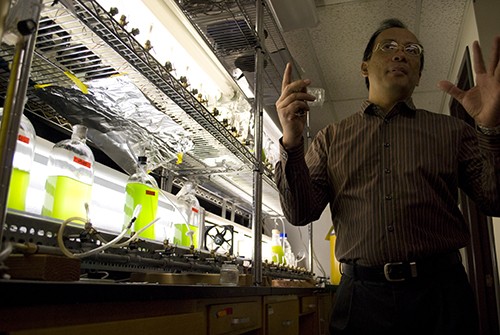The green stuff growing at the bottom of your pool and on the side of your fish tank might one day be powering your car.
Joel Cuello, professor of agricultural and biosystems engineering, has been chosen as one of 15 experts to sit on a panel examining potential threats involved with algae biofuels.
The U.S. National Academies’ committee on the Sustainable Development of Algae Biofuels, will be tasked to identify unforeseen concerns and potential threats environmentally and to humans. The group will also be searching for ways to quantify these concerns in order to develop possible solutions.
Cuello has been working with algae for about 10 to 12 years.
“”It’s a very good candidate as a feedstock for biofuels because it’s renewable, meaning to say you can grow it,”” Cuello said. “”Number two, it’s got a high productivity in terms of oil. Much greater than all the others.””
Algae are a good option because, unlike first generation feedstocks for biofuels, such as corn and soybeans, no one wants to eat it.
“”It’s like taking away food from the dining table and using it to produce food to fuel your car,”” Cuello said. “”The bad effect of that is the price of food goes up and a lot of people in poor countries are not able to afford food when the price of food goes up.””
Resources such as land and water needed to produce algae biofuels are a potential concern. Though algae biofuel can be grown on agricultural land, there are concerns this might limit the land available for food production.
“”We have very limited resources in terms of fresh water,”” Cuello said. Using fresh water for algae production could be a problem.
“”That could be a concern because that water could be used for food production and for other purposes as well,”” he said.
Agricultural land does not have to be used to grow algae and wastewater can also be used in algae production.
Another problem is potential risks to humans and the environment with algae that has been genetically modified to produce more fuel.
During the next year and a half, Cuello and the committee will look at data to identify gaps in knowledge, possible threats and propose recommendations on the best way to go about producing algae biofuels.
The committee already had its first meeting in Washington, D.C., and the next meeting will be held in June.









